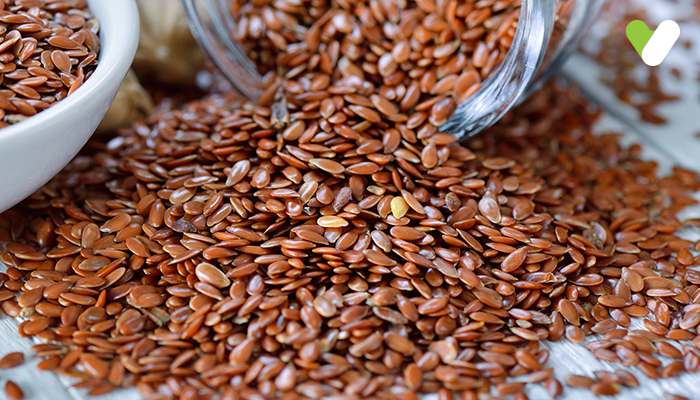Flaxseeds or Alsi are tiny seeds of health that were not well-known until the last few decades. But now the whole world is trying to use these seeds in some or another form to extract the health benefits. These edible seeds come from the flax plant and have now gained the status of being one of the superfoods. From your heart to intestine, skin to hair, there is hardly any part of your body where you can’t fetch flax seeds health benefits.
Reading about the various flax seeds benefits you are to pick a pack of these seeds from your nearby grocery store.
Flax Seeds Nutrition
Just 10 grams or 1 tablespoon of flax seeds contain the following nutrients:Calories – 50
Fat- 4.2 grams
Carbohydrates- 3 grams
Fiber- 2.7 grams
Protein- 2 grams
Sugar- 0.2 grams
Water- 7%
Besides, flax seeds are a good source of various minerals and vitamins like magnesium, phosphorus, copper, molybdenum, and thiamine. These small seeds are also a power-packed bundle of Omega 3 fatty acids and antioxidants like lignans, phytosterols, ferulic acid, and cyanogenic glycosides.
Top 9 Flax Seeds Health Benefits
Here is a list of the top 9 flax seeds uses for health:Good for Heart: One of the topmost health benefits of using alsi or flax seeds is that they are good for your heart. Just using about 3 spoons of flaxseed powder daily has been found to reduce LDL or bad cholesterol, thereby reducing the chances of strokes.
Fibre-rich Seeds Aids in Digestion: Flax seeds are rich in insoluble as well as soluble fiber. Both these types of fiber help together to aid in problem digestion in the body. They are good for your gut health and help the digestive system to throw out complete waste from the body. In short, flax seeds help prevent constipation and irritable bowel syndrome.
Maintains Blood Sugar Levels: Daily consumption of flax seeds helps to maintain blood sugar levels, thereby giving relief to people with diabetes. They must try to include flax seeds in their diet to control their blood glucose levels in a completely natural way.
Prevents Cancer Risk: Consuming flax seeds regularly in powder or whole seed form helps in preventing the formation of tumors and cancers. This happens due to the antiangiogenic properties of these seeds that help them prevent cancers of the colon, breast, and prostate. These seeds when consumed regularly help in preventing tumors to form the growth of new blood vessels.
Omega 3s and Anti-Ageing Properties: These tiny seeds are a rich source of antioxidants like lignans that help to restore cellar health and thereby prevent aging. Besides, they are a powerful source of Omega 3 fatty acids like ALA or Alpha-Linolenic Acid that maintain Vitamin C and E levels in the body.
Flax Seeds Benefits for Skin: When discussing flax seed’s benefits, we can’t ignore mentioning their benefits for the outer body as well. Flax seeds are a blessing not just for the internal organs but for the external organs like the skin. Flaxseed oil is known to reduce skin sensitivity and make it hydrate and smooth.
Control the Hair Frizz: Flaxseed gel is a tried and tested formula to tame frizzy hair. Moreover, the gel will leave your hair with a bounce and shine that was never there before. These seeds are rich in Vitamin B and E along with high Omega 3 fatty acids, and all these nutrients promote hair growth while making them manageable.
Promotes Weight Loss: Just like chia seeds, flax seeds when mixed with water form a gel-like substance. This when consumed by a weight watcher helps in delaying the hunger pangs. As a result, a person feels fuller for a longer period and the calorie intake is reduced. All this ultimately aids in weight loss.
Good for Bone Health: Being a rich source of phosphorus and magnesium, flax seeds are considered good for overall bone health. Those who consume these tiny seeds regularly were seen to improve their bone health and get relief from osteoporosis. Combining flax seeds with curd helps to get a powerful dose of calcium along with phosphorus and magnesium for super bone health.
Types of Flax Seeds
Flaxseeds can be used in a ground or whole seed form. According to experts, using it in ground form is better because it is easier for the body to absorb its nutrients. Whereas using whole flax seeds may lead to indigestion and you might not be able to extract its complete health benefits. Some people also prefer using flaxseed oil as per their requirements.Right Way to Consume Flax Seeds
We assume reading about so many Flax Seeds uses for health, you must be curious to know the right way to consume these seeds. So, here are the best ways to use them to get all the flax seeds nutrition:- Sprinkle ground flaxseeds on your breakfast cereal.
- Mix these seeds in your yoghurt,
- Use them to bake cookies and muffins.
- Mix a tablespoon of ground flaxseeds in your salad dressings.
Risk Factors with Flax Seeds Uses
- Over-consumption may lead to diarrhoea
- May cause allergic reactions
- Risky for pregnant and lactating ladies
- Avoid if you are trying to conceive
- May promote intestinal blockage
- Counter-react with some medications
Conclusion
To get flax seeds benefits for skin, you can use it in an oil form, whereas, if you want to fetch its health benefits, then there are various recipes available on the internet. You can make several delicious recipes using flax seeds and if nothing appeals much, try consuming them by sprinkling them on your salads and pancakes.
